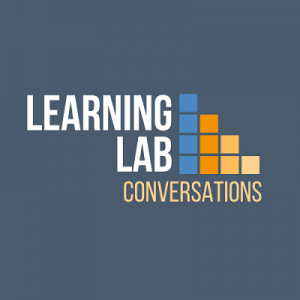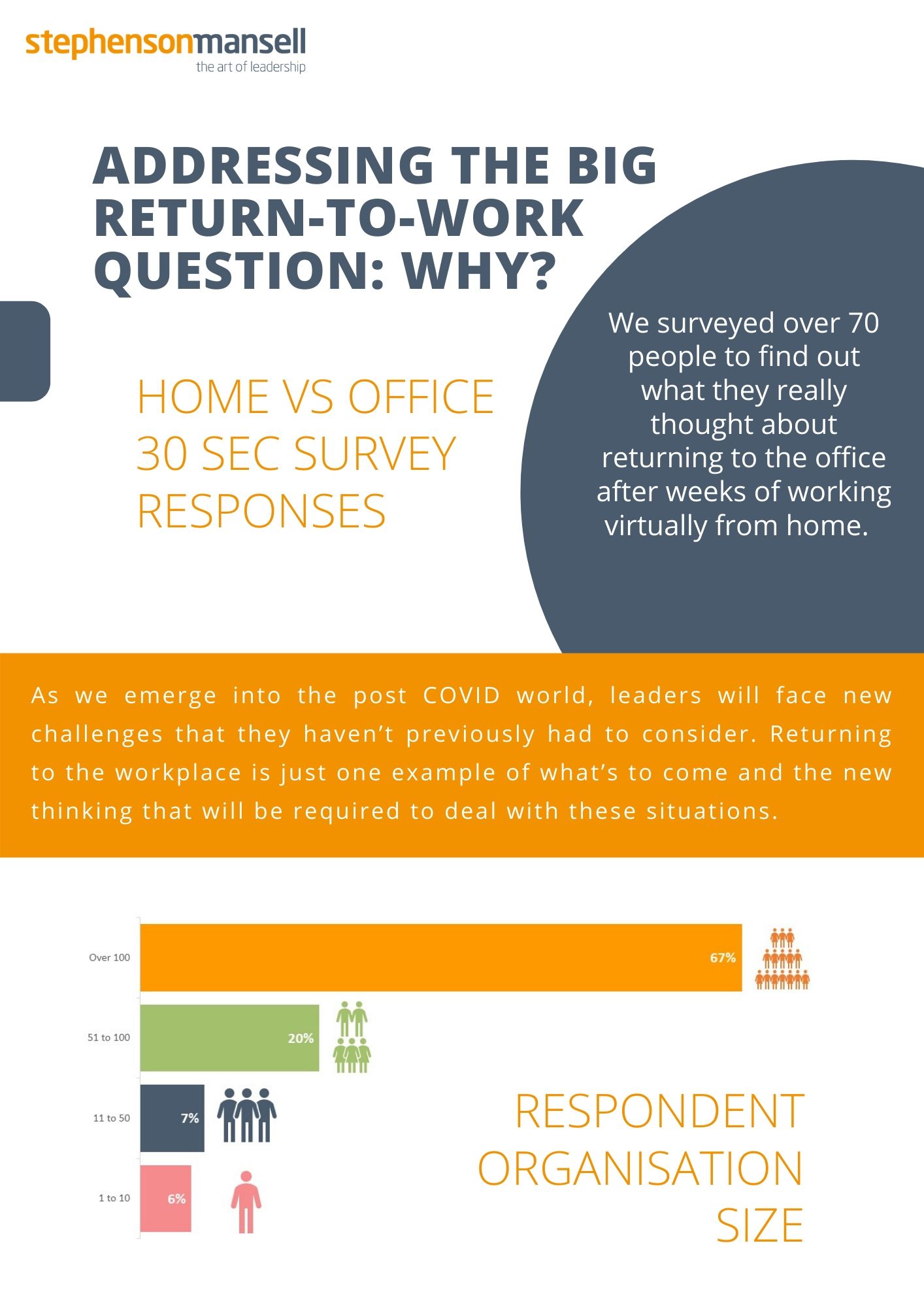Why a Return to the Office is in our DNA
The Art of Leadership Newsletter
As leaders, never before have we faced such rapid change and uncertainty, nor had to adapt at such pace. With light at the end of the tunnel for social distancing restrictions – many leaders are grappling with the vital question: Why do we need to return to the office? Our blog this month explores what we have learned from our COVID-19 experiences and how they may shape our new way of working.
We are delighted to announce our latest initiative – Learning Lab Conversations. A series of conversations allowing you to focus on the challenges and opportunities ahead and have meaningful dialogue, sharing experiences with a network of peers. Our first session with Alison Strasser will be held on the 9th July – places are limited so get in quickly.
Regards
Virginia Mansell
Founding Partner
Why a Return to the Office is in our DNA

With the spectre of COVID-19 still looming large, many leaders are grappling with a vital question: Why do we need to return to the office?
Some people are expected to stay away until a vaccine is (fingers crossed) developed. Employees of Twitter have been told they are welcome to work from home forever, while many other knowledge workers don’t expect to be recalled until at least the end of the year.
By the time everyone thinks it is safe to go back, there may be no desks available anyway. Employers, trying to stave off the expected recession, may have sublet or surrendered the space.
Our own research in the past two weeks across a broad range of companies strongly indicates the main reason that people are resisting the return to the office is the anxiety of travelling on public transport.
However, an overwhelming number of respondents – 96% — said they did want to go back to office in some form:
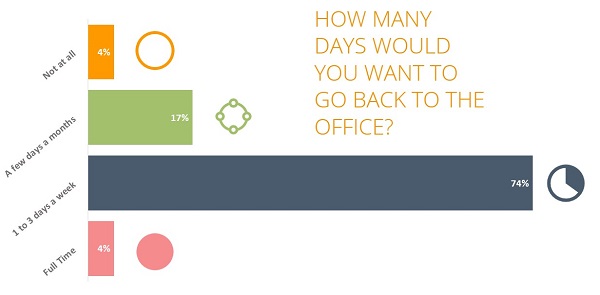
As humans we are social creatures. Going back to the office is a social anchor. Creating the incidental and deeply relational connections – over the watercooler, in the corridor, in the corporate kitchen – can’t be replicated over video conference. Self-isolation is creating what in psychological terms is known as social exclusion.
Neuroscientist Matthew Lieberman, author of Social: Why Our Brains Are Wired To Connect, says our need to connect is as fundamental as our need for food and water. He says social exclusion creates a brain response similar to physical pain.
People need people … so does business
Aside from the mental health risks of social isolation and loneliness, there are other important reasons for people to gather in person. Good communication relies on the subtle physical cues that come from face-to-face interactions. This is one of the reasons a day of videoconferences is exhausting – we have to work so much harder to “read” other people.
We also learn so much from our incidental interactions with others at work, especially when those people bring different life experiences (being of different generations and cultural backgrounds).
Having strong team and peer groups relationships at work, as Gallup research shows, dramatically increases the amount of effort people put into their work. We feel like we belong to a tribe or community and have a sense of togetherness around our purpose and meaning. This creates great energy when we are all together working towards the same goals. It is so much harder to feel a sense of relationship and connection in a virtual world.
Of course, there is another pressing reason for us to go back to the office. We need to get away from the endless distractions and conflicting priorities i.e. the leaf-blowers, barking dogs, couriers, visitors who don’t believe it is a “workday” and for some of us, small children. We need some peace and quiet and the commute to and from work offers the separation from work and home.
Let’s not forget what we have learned.
Having months away has been an opportunity for many of us to reassess our priorities. It would be a great shame to go back to old habits reflexively.
Here are a few things that should stay with us:
A sense of belonging: If we want people to return to the workplace, we have to find compelling reasons to be there. One such motivation is our need to be part of a tribe.
We also need to have a purpose to be at work i.e. team meetings for project based activities, management meetings, to brainstorm and create. The physical distancing restrictions are an opportunity to assess whether our office layouts and practises were welcoming to our “work family”, or made people feel like visitors.
Hot-desking and activity-based-working do not suit everyone. Perhaps it is time to tailor work environments to individuals, with personal desks for those that want them, collaborative space when they need it, seclusion and quiet when they want to concentrate.
Trust and care: Leaders have had to learn to trust their people. Letting go of the harness would have been a cultural shock to some of those people. Those employees who proved their reliability should continue to be trusted to make adult decisions about how, where and when they work. Learning to manage by output not input is a new muscle to develop for leaders who are used to a more micro-management style.
At the same time, leaders have had to demonstrate empathy during the crisis to help take care of employees who were struggling emotionally, physically or economically. Relationships have been deepened and, after COVID-19, workers will expect that level of care to continue. The challenge will be demonstrating care while also encouraging the performance and accountability required for business results.
People have had to learn to be more direct, explicit and deliberate in their communication to ensure they would not be misunderstood in a virtual meeting.
Performance: Over the past few months, leaders had to work out how to get results when everything changed. Some questions to consider are:
- How will we assess the performance of our people in the future?
- What has motivated them?
- How adaptable were we?
- Where did innovation come from?
- What impact did working from home have on productivity and what can we learn from that?
- Do some of our policies and processes get in the way of our effectiveness?
Priorities: One of the first things we all noticed during the shutdown was a shift in our perspective of what is important to us. We may have enjoyed the extra time with family and worried more about those from whom we were separated.
We focused more on our health.
Many of us wondered why we invested so much in work at the expense of other things we value – and now realise that a better balance is possible. Let’s not lose the good things we have learned in this extraordinary time.
About the Author
Virginia Mansell is Founding Partner, Stephenson Mansell Group
What’s On
LUNCH AND LEARN WEBINAR:
Future-proofing Leadership
Join award-winning former BBC broadcast journalist and SMG Senior Partner Mehul Joshi along with Susan Ferrier, NAB Chief People Officer, Virginia Mansell, clinical and organisational psychologist and SMG Founding Partner, and Alex Scandurra, CEO of technology innovation hub, Stone and Chalk, as they explore the leadership attributes such as adaptability, agility, empathy, creativity and resilience and how to develop them at an organisational level.
LIVE: Monday 15 June 2020 12.00-1.00pm AEST
Click here to register for free
New to Stephenson Mansell Group our Learning Lab Conversations are here to guide leaders during this time of change. The Series allows you to connect with both thought leaders and peers to discuss the big ideas and issues in a collaborative and inspiring way. The sessions include facilitated discussion, followed by smaller group breakouts, and conclude with group sharing.
Session One: “How do we hold onto our new-found freedom in the new normal?”
Online – Thursday 9th July 2020, 12.00 – 1.15pm AEST
COVID-19 has had a profound impact on us all in different ways, yet it has also allowed us to stop, reflect and think about what matters most. So, how has COVID-19 changed us and ultimately what will it mean for us moving forward? How do we find a balance between purpose and freedom in our new normal?
Join Alison Strasser in conversation with Virginia Mansell, as they lead a discussion on understanding our new sense of freedom, and the importance that anxiety plays on helping us form our decisions.
Register Here (Places strictly limited to 100 participants)
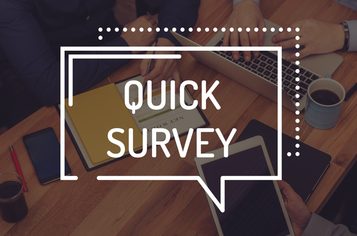 Future-proofing Leadership 30-second Survey
Future-proofing Leadership 30-second Survey
What are the essential leadership attributes that need to be developed for organisations to thrive now and into the future.
Executive Presence and Impact Workshop with Peter Kingston – In Person
 Following strict guidelines, we will be running our popular Executive Presence and Impact Program in Sydney and Brisbane.
Following strict guidelines, we will be running our popular Executive Presence and Impact Program in Sydney and Brisbane.
Peter’s ability to engage with his audience and personally encourage participants to step out of their comfort zone and challenge the way they present themselves, makes this a program not-to-be-missed.
SYDNEY: 25th June 2020 Coming up soon
BRISBANE: 2oth August 2020 Only 3 places remaining
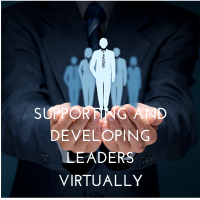 Explore our new virtual resources and programs to support leaders through COVID-19
Explore our new virtual resources and programs to support leaders through COVID-19
The dramatic impacts of COVID-19 on organisations and their people has meant that leaders have had to find a new level of agility and adaptability.
Our COVID-19 resources including dedicated Webinars, Downloadable Resources, One-on-One and Team Virtual Programs have been specifically developed to help you and your organisation meet changing needs.
Explore our new virtual resources to support leaders through COVID-19
Join us live each fortnight as we tackle current leadership issues and offer practical tools and strategies through our webinars.
From Strategic Leadership, to Communicating in a Virtual World and Leading through Uncertainty – these online sessions have become a must attend for leaders at all levels.
Access recordings of all our past webinars on our website, or join us live for your opportunity to engage and delve into Q&A with the panellists.
View our past webinar recordings and see what’s coming up next
What’s Trending in Leadership
Home Vs. Office Survey Report
With recent changes to social distancing restrictions, we ran a survey to gauge opinions into the next expected move… back into the office. So what will our “New Normal’ look like?
Download the Survey Findings Here
SMG Recommends
In need of some inspiration…
Leadership in a Post-Pandemic World
HBR outline how some leaders are preparing to lead for the long haul ahead.


